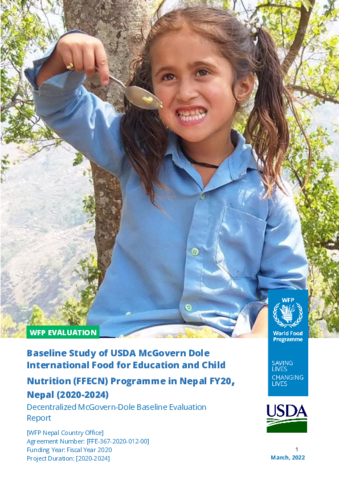
This decentralized evaluation was commissioned by the WFP Nepal Country Office and covers the Baseline Study of USDA McGovern Dole International Food for Education and Child Nutrition (FFECN) Programme in Nepal Fiscal Year 20 (2020-2024). It was carried out between August 2021 and March 2022.
The evaluation was commissioned to establish the baseline data for standard and custom outcome indicators in line with the approved Performance Monitoring Plan, and provide a situational analysis before the project begins, and the context necessary for the midterm and end-line evaluations to assess coherence, relevance, effectiveness, efficiency, sustainability, and impact of the project. Among them, the baseline survey focused on three evaluation criteria and questions identified during the inception phase
It was intended for both accountability and learning purposes. Overarching evaluation questions included:
- To what extent are the McGovern-Dole FY20 programme activities aligned with government policies, and with WFP guidelines and policies?
- How the McGovern-Dole FY20 programme goals and design are aligned with the beneficiary and stakeholder’s needs?
- The extent to which the programme has been designed to sustain the benefits generated by the project.
Key evaluation findings included:
- The programme is quite relevant as it clearly aligns with beneficiaries’ and stakeholders’ needs, including those of girls and the socially disadvantaged. The programme is innovative in its whole cycle approach to health and education that mainly encompasses improvements in children’s attendance in public schools. One of the findings however indicates the need of introducing an effective mechanism for monitoring the midday meal.
- The programme is largely guided by clear intention to contribute towards achieving Sustainable Development Goal (SDG) 4. Attainment of quality education sets the stage for the achievements of other SDGs including SDG 3 and SDG 6.
- The programme appears to align with the Nepal government’s commitments towards improving children’s enrolment in public schools, and reduction in repetition and dropout rates including the Education Sector Plan (ESP, 2021-2030). The government has also prioritized School Health and Nutrition program.
- Some of the challenges include i) lack of effective coordination among the three tiers of the government; ii) lack of capacity among the officials particularly at the local government units, and iii) lack of clarity of roles among all tiers of government. This has an overall bearing on the implementation of the USDA McGovern-Dole FY20.
- Nepal's government is highly invested in a national school meals programme. The Fiscal Year 20 cycle has incorporated the learnings from the previous cycle to ensure a smooth transition of the handover districts.
Key lessons learnt and conclusion included:
- The evaluation revealed the need of improving the awareness of School Meals Programme among parents and students. Cleanliness of school kitchen, proper ventilation, and installation of improved cooking stove need to be ensured across the schools.
- Adequate availability and use of health, nutrition, and WASH-related Information, Education, and Communication and Behaviour Change Communication packages should be ensured in all schools.
- Local farmers should be provided adequate knowledge, skills, and resources for adopting improved agricultural management practices and technologies.
- The literacy outcomes of the students as assessed through EGRA are not satisfactory. Considering the vital and cross-curricular importance of reading skills, any reforms targeted at improving the literacy outcomes and their associated factors should incorporate a programmatic reform in the input and infrastructures.
- Lessons learned from data limitations due to lack of school records need to be accorded a priority, and the school administrators should be encouraged and trained to keep necessary information systematically.
| Document | File |
|---|---|
| Terms of reference |
PDF | 671.56 KB
Download
|
